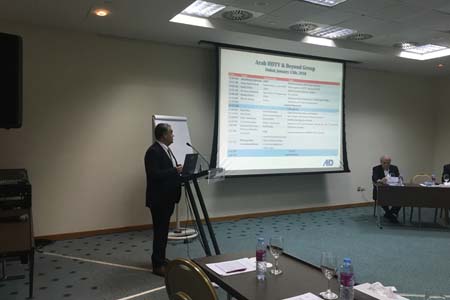The Director General of ASBU also announced the formation of a new group focusing on Artificial Intelligence, which will lead to the dissolution of the Arab HDTV & Beyond Group.
The 17th annual meeting of the Arab HDTV and Beyond Group took place at the Novotel World Trade Centre, Dubai, on May 22, 2024. The event was held under the patronage of Eng. Abdelrahim Suleiman, Director General of the Arab States Broadcasting Union (ASBU).
The meeting was presided over by Dr Fares Lubbadeh, CEO of SpaceTech TV Engineering, with Dr Riyadh Najm, CEO of Shashah World, serving as the group’s Honorary Chairman, and Eng. Samir Asiri, Assistant President of the Saudi Broadcasting Authority (SBA), acting as Vice-Chair. Eng. Bassil Zoubi, Director of the ASBU Technology and Development Department, also played a significant role. The gathering was attended by professionals representing both state and private broadcasters from Arab states, as well as regional and international manufacturers, service providers, and systems integrators.
Abdelrahim Suleiman welcomed the attendees and provided an update on ASBU’s current activities. He announced the formation of a new group focused on Artificial Intelligence (AI), which will result in the dissolution of the Arab HDTV & Beyond group. Suleiman expressed gratitude for the group’s contributions to spreading HDTV in the Arab world and invited attendees to ASBU’s 24th Arab Radio and Television Festival in Tunisia from June 26-29, 2024.
Dr Fares Lubbadeh presented on the “Global Situation of UHDTV,” noting that 4K resolution is a natural progression dependent on equipment replacement cycles. He mentioned that while 8K resolution is not yet a priority for broadcasters, it is gaining traction in the market as a high-quality display option. He also highlighted the rise of smart TVs, which offer enhanced access to streaming services and online content.
Eng. Bassil Zoubi discussed “ASBU Technical Activities Update,” covering the ASBU Cloud Platform, requirements, workflows, and service challenges. He also addressed enhancing production workflows, cybersecurity, UHF spectrum issues, early warning systems, and the Global Arab Bouquet.
Andreas Hilmer, Chief Marketing Officer of Lawo, presented on “Vision of the Future: Unlimited Scalability for Live Production Infrastructure.” He emphasised that transitioning broadcast infrastructure to IP is essential for advancing live production technology. He described innovative system design approaches that offer unlimited flexibility and scalability, enabling more efficient use of processing capacity and investments. Andreas highlighted the benefits of containerised, scalable, dynamic software on standard servers, differentiating between software-based and platform-based solutions, and outlined the technical and commercial prerequisites for implementing these technologies in production.
Thomas Gunkel, Market Director at Skyline Communications, introduced “MediaOps,” focusing on harmonising ICT and media workflows to optimise operational efficiency. He discussed the unique requirements of media teams and the integration of IT concepts into media operations.
Luke Williams, Sales Director for the Middle East & Africa at Mediakind, presented “Bring Your Own AI, Create Value in Broadcast Streaming.” He highlighted AI’s potential to streamline media functions, reduce costs, and improve accuracy, illustrating its adoption in video workflows with practical examples.
Hasan R. Sayed Hasan, Managing Director of Master Media, delivered a presentation titled “Media in the Artificial Intelligence Era: Opportunities and Challenges.” He introduced the guidelines and recommendations from the Arab Media Congress, focusing on national and regional levels, media organisations, collaboration between media organisations and AI developers, the role of AI in journalism and newsrooms, and the challenges of generating Arabic content with AI.
In his presentation “Introduction to Artificial Intelligence Next Generation,” Dr Fares Lubbadeh highlighted AI’s transformative potential, projecting it will add $15.7tn to the global economy by 2030. He discussed how AI-driven technologies will revolutionise various sectors, including medicine, transportation, cybersecurity, media and entertainment, automation, education, manufacturing, e-commerce, government, and robotics. While AI may render some jobs obsolete, it is expected to create more new jobs, continuing the historical trend of technological advancement. Lubbadeh also noted that AI, despite its capabilities, will never achieve human-like sentience and will serve as an invaluable assistant rather than a threat to humanity.
In his presentation “Artificial Intelligence in TV Production & Broadcasting,” Mohit Goyal, Senior Business Development Professional at Evertz, covered several key aspects of AI’s integration in the industry. First, he explored AI’s role in content creation, including metadata markup on archived content, automated editing and highlights, and real-time rendering. Second, he discussed AI’s impact on production and broadcast quality, emphasizing its capabilities in monitoring complex systems, maintaining signal and program integrity, and improving scheduling and delivery processes. Third, he highlighted AI-driven enhancements in audience engagement, such as interactive experiences facilitated by chatbots, sentiment analysis, and recommendation systems. Additionally, Goyal addressed ethical considerations and challenges in AI implementation, including privacy and creativity concerns, algorithmic biases, and the dynamics of human-AI collaboration.
Naser Refat, CTO & Investment Officer at Rotana Media Group, presented “Introduction to AI Growth,” where he defined AI and its evolution, discussed current applications of AI in government and private sectors, and introduced AI-driven technologies in healthcare and finance. He also explained the challenges and opportunities in AI implementation, and discussed ethical considerations along with emerging AI technologies and innovations.










































































